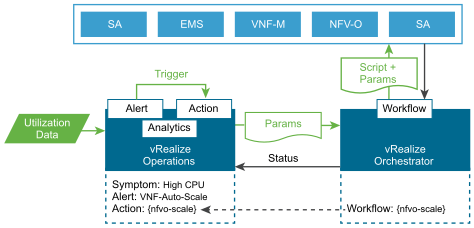Automation is key to the cloud infrastructure platform, ensuring that it is dynamic and adaptive to the workloads and consumption models. During operation, workloads experience an increase in traffic demand, congestion across resources and virtualization layers, therefore a proactive optimization approach is very effective.
The vCloud NFV OpenStack Edition analytics framework provides key capabilities to develop closed-loop automation. This includes the ability to define intent-based operational policies and alerts as well as actions to enforce the alerts. You can use the framework to manage performance, resources and workload life cycle running within the cloud infrastructure.
In the next generation networks, the workloads will undergo changes in demand and utilization requiring the optimization of allocated resource pools. Infrastructure resources (CPU, memory, storage, network) might need to be added or reclaimed and their reservations modified. Workloads might need to be migrated to a less loaded host or cluster that has available resources. Workload life cycle management is equally critical to ensure restart, including network function component boot sequence, scale, and heal operations in accordance to the operational policies that are defined. The closed loop automation for such challenges can be addressed at the NFV infrastructure layer and at the service orchestrator and VNF-M layers.
vRealize Orchestrator together with vRealize Operations Manager provides the framework for closed-loop automation. They separate the policy, alert definition and management from the decision point and enforcement. Actions can be triggered back to the NFV infrastructure or directed to third-party external systems.

When the alert is raised, the vRealize Orchestrator workflow is triggered, notifying the north-bound component recipient which will then carry out the remediation appropriate for that application it is managing.